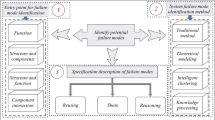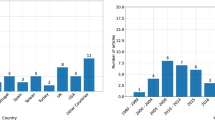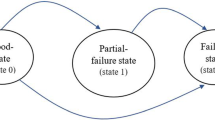Abstract
In this study, an effective method for reliability-based design optimization is proposed enhancing sequential optimization and reliability assessment (SORA) method by a family of methods of moving asymptotes (MMA) approximations. In SORA, reliability estimation and deterministic optimization are performed sequentially. And the sensitivity and function value of probabilistic constraint at the most probable point (MPP) are obtained in the process of finding reliability information. In this study, a family of MMA approximations are constructed by utilizing the sensitivity and function value of the probabilistic constraint at the MPP. So, no additional evaluation of the probabilistic constraint is required in constructing MMA approximations. Moreover, no additional evaluation of the probabilistic constraint is required in the deterministic optimization of SORA by using a family of MMA approximations. The efficiency and accuracy of the proposed method were verified through numerical examples.




Similar content being viewed by others
References
Bruyneel M, Duysinx P, Fleury C (2002) A family of MMA approximations for structural optimization. Struct Multidisc Optim 24:264–276
Chen X, Neil DJ (1997) Reliability based structural design optimization for practical applications. In: AIAA-97-1403, pp 2724–2732
Du X, Chen W (2004) Sequential optimization and reliability assessment method for efficient probabilistic design. ASME J Mech Design 126:225–233
Fleury C, Braibant C (1986) Structural optimization: a new dual method using mixed variables. Int J Numer Methods Eng 23:409–428
Golinski J (1970) Optimal synthesis problems solved by means of nonlinear programming and random methods. ASME J Mech Des 5(4):287–309
Haldar A, Mahadevan S (2000) Reliability assessment using stochastic finite element analysis. Wiley, New York
Hasofer AM, Lind NC (1974) Exact and invariant second moment code format. J Eng Mech ASCE 100:111–121
Ju BH, Lee BC (2008) Reliability-based design optimization using a moment method and kriging metamodel. Eng Optim 40(5):421–438
Kaymaz I (2005) Application of kriging method to structural reliability problems. Struct Saf 27:133–151
Kharmanda G, Mohamed A, Lemaire M (2002) Efficient reliability-based design optimization using a hybrid space with application to finite element analysis. Struct Multidisc Optim 24:233–245
Kuschel N, Rackwitz R (2000) A new approach for structural optimization of series systems. Appl Stat Prob 2(8):987–994
Lee TW, Kwak BM (1987–1988) A reliability-based optimal design using advanced first order second method. Mechan Struct Mach 15(4):523–542
Lee JJ, Lee BC (2005) Efficient evaluation of probabilistic constraints using an envelope function. Eng Optim 37(2):185–200
Lee IJ, Choi KK, Gorsich D (2009) Sensitivity analysis of FORM-based and DRM-based performance measure approach for reliability-based design optimization. Int J Numer Methods Eng. doi:10.1002/nme.2752
Mohsine A, Kharmanda G, El-Hami A (2006) Improved hybrid method as a robust tool for reliability-based design optimization. Struct Multidisc Optim 32:203–213
Rackwitz R, Fiessler B (1978) Structural reliability under combined random load sequence. Comput Struct 9:489–494
Rosenblatt M (1952) Remarks on a multivariate transformation. Ann Math Stat 23(3):470–472
Svanberg K (1987) The method of moving asymptotes-a new method for structural optimization. Int J Numer Methods Eng 24:359–373
Svanberg K (2002) A class of globally convergent optimization methods based on conservative convex separable approximations. Soc Ind Appl Math 12(2):555–573
Svanberg K (2007) MMA and GCMMA, versions September 2007. http://www.math.kth.se/~krille/gcmma07.pdf. Accessed 20 March 2009
Tu J, Choi KK, Park YH (1999) A new study on reliability based design optimization. J Mech Design ASME 121:557–564
Yang RJ, Gu L (2004) Experience with approximate reliability-based optimization methods. Struct Multidisc Optim 26:152–159
Yang RJ, Chuang C, Gu L, Li G (2005) Experience with approximate reliability-based optimization method II: an exhaust system problem. Struct Multidisc Optim 29:488–497
Youn BD, Choi KK, Park YH (2003) Hybrid analysis method for reliability-based design optimization. J Mech Design 125:221–232
Youn BD, Choi KK, Du L (2005a) Adaptive probability analysis using an enriched hybrid mean value method. Struct Multidisc Optim 29:134–148
Youn BD, Choi KK, Du L (2005b) Enriched performance measure approach for reliability-based design optimization. AIAA J 43(4):874–884
Zhang WH, Fleury C (1997) A modification of convex approximation methods for structural optimization. Comput Struct 64(1–4):89–95
Zillober C (1993) A globally convergent version of the method of moving asymptotes. Struct Optim 6:166–174
Zou T, Mahadevan S (2006) A direct decoupling approach for efficient reliability-based design optimization. Struct Multidisc Optim 31:190–200
Zuo KT, Chen LP, Zhang YQ, Yang J (2007) Study of key algorithms in topology optimization. Int J Adv Manuf Technol 32:787–796
Author information
Authors and Affiliations
Corresponding author
Rights and permissions
About this article
Cite this article
Cho, T.M., Lee, B.C. Reliability-based design optimization using a family of methods of moving asymptotes. Struct Multidisc Optim 42, 255–268 (2010). https://doi.org/10.1007/s00158-010-0480-3
Received:
Revised:
Accepted:
Published:
Issue Date:
DOI: https://doi.org/10.1007/s00158-010-0480-3




